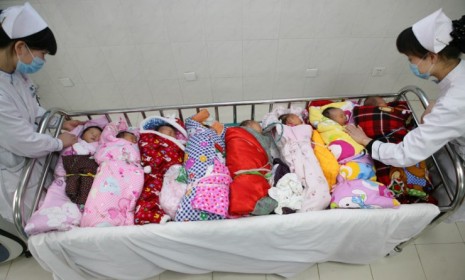China's 'Year of the Dragon' baby boom: A guide
The Chinese new year just began this week, but the rush to have babies under the culture's luckiest zodiac sign has been underway for months

A free daily email with the biggest news stories of the day – and the best features from TheWeek.com
You are now subscribed
Your newsletter sign-up was successful
China is in the midst of a baby-making boom, as couples try to ensure that their children are born during the Year of the Dragon, which began Monday. The dragon is considered the most auspicious zodiac sign in Chinese culture. Once reserved for the emperor, it is believed to bring strength and good luck. Here, a brief guide to the coming wave of "dragon babies":
Why is the Year of the Dragon so lucky?
Eleven of the 12 zodiac symbols in Chinese culture are animals — the dragon is the only one that is a mythical creature. That's one of the reasons it's so lucky, and that's why the state news agency Xinhua says China is expecting a 5 percent jump in the number of babies born in 2012. Boys, especially, are said to be destined for success and wealth if they're born under the sign.
The Week
Escape your echo chamber. Get the facts behind the news, plus analysis from multiple perspectives.

Sign up for The Week's Free Newsletters
From our morning news briefing to a weekly Good News Newsletter, get the best of The Week delivered directly to your inbox.
From our morning news briefing to a weekly Good News Newsletter, get the best of The Week delivered directly to your inbox.
So Chinese parents are scheduling their pregnancies accordingly?
They sure are. The math is easy enough to figure out: Parents have to get pregnant by May 2 of this year to squeeze in their due date before Feb. 9, 2013, when the Year of the Dragon ends and the less auspicious Year of the Snake begins. Once the lunar calendar turns over, the baby boom is expected to come to a screeching halt. "The dragon baby boom seems unlikely to have a significant impact on the total fertility rates in the long run,'' Dr. Zhang Yanxia tells the BBC.
How else will this affect China?
Infertility clinics are bracing for a spike in women seeking in vitro fertilization treatment during the coming year, says Dr. Chen Shee-Uan, director of reproductive endocrinology and infertility at the National Taiwan University Hospital. And parents are sparing no expense to prepare for their dragon babies. As a result, nannies in Beijing have been able to double their rates, and "beds in the Chinese capital's Maternity Hospital are booked until August," says Ian MacKinnon in Britain's Telegraph. And the effects won't end there. The baby boomlet means all those dragon babies destined for such greatness will soon be locked in fierce competition for spots in China's best schools, as the dragon babies of the year 2000 are now.
A free daily email with the biggest news stories of the day – and the best features from TheWeek.com
Sources: BBC, Huffington Post, Telegraph, TIME
-
 Health insurance: Premiums soar as ACA subsidies end
Health insurance: Premiums soar as ACA subsidies endFeature 1.4 million people have dropped coverage
-
 Anthropic: AI triggers the ‘SaaSpocalypse’
Anthropic: AI triggers the ‘SaaSpocalypse’Feature A grim reaper for software services?
-
 NIH director Bhattacharya tapped as acting CDC head
NIH director Bhattacharya tapped as acting CDC headSpeed Read Jay Bhattacharya, a critic of the CDC’s Covid-19 response, will now lead the Centers for Disease Control and Prevention